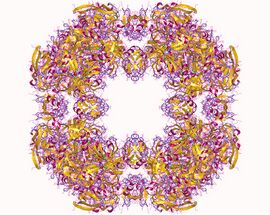Biology:Peptidase Do
From HandWiki
| Peptidase Do | |||||||||
|---|---|---|---|---|---|---|---|---|---|
 Protease do homo24mer, E.Coli | |||||||||
| Identifiers | |||||||||
| EC number | 3.4.21.107 | ||||||||
| CAS number | 161108-11-8 | ||||||||
| Databases | |||||||||
| IntEnz | IntEnz view | ||||||||
| BRENDA | BRENDA entry | ||||||||
| ExPASy | NiceZyme view | ||||||||
| KEGG | KEGG entry | ||||||||
| MetaCyc | metabolic pathway | ||||||||
| PRIAM | profile | ||||||||
| PDB structures | RCSB PDB PDBe PDBsum | ||||||||
| |||||||||
Peptidase Do (EC 3.4.21.107, DegP, DegP protease, HtrA, high temperature requirement protease A, HrtA heat shock protein, protease Do, Do protease) is an enzyme.[1][2][3][4][5][6] This enzyme catalyses the following chemical reaction
- Acts on substrates that are at least partially unfolded. The cleavage site P1 residue is normally between a pair of hydrophobic residues, such as Val-Val
This Escherichia coli serine endopeptidase is essential for the clearance of denatured proteins from the inner-membrane and periplasmic space.
References
- ↑ "The HtrA (DegP) protein, essential for Escherichia coli survival at high temperatures, is an endopeptidase". Journal of Bacteriology 172 (4): 1791–7. April 1990. doi:10.1128/jb.172.4.1791-1797.1990. PMID 2180903.
- ↑ "Protease Do is essential for survival of Escherichia coli at high temperatures: its identity with the htrA gene product". Biochemical and Biophysical Research Communications 176 (2): 730–6. April 1991. doi:10.1016/s0006-291x(05)80245-1. PMID 2025286.
- ↑ "Escherichia coli DegP protease cleaves between paired hydrophobic residues in a natural substrate: the PapA pilin". Journal of Bacteriology 184 (20): 5762–71. October 2002. doi:10.1128/jb.184.20.5762-5771.2002. PMID 12270835.
- ↑ "Isolation and characterization of protease do from Escherichia coli, a large serine protease containing multiple subunits". Archives of Biochemistry and Biophysics 224 (2): 543–54. July 1983. doi:10.1016/0003-9861(83)90242-4. PMID 6347072.
- ↑ "The HtrA family of serine proteases". Molecular Microbiology 26 (2): 209–21. October 1997. doi:10.1046/j.1365-2958.1997.5601928.x. PMID 9383148.
- ↑ "Crystal structure of DegP (HtrA) reveals a new protease-chaperone machine". Nature 416 (6879): 455–9. March 2002. doi:10.1038/416455a. PMID 11919638.
External links
- Peptidase+Do at the US National Library of Medicine Medical Subject Headings (MeSH)
 |

